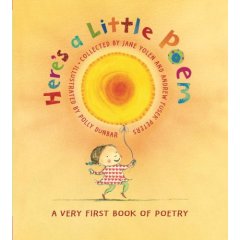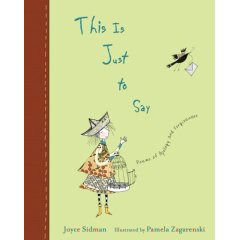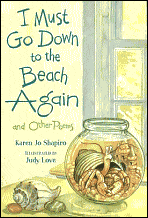Poetry Friday Reviews: Three Excellent
Children’s Poetry Anthologies
 June 15th, 2007 by jules
June 15th, 2007 by jules
{Note: Today’s Poetry Friday round-up is over here at The Simple and the Ordinary}.

A Very First Book of Poetry
Collected by Jane Yolen and
Andrew Fusek Peters
Illustrated by Polly Dunbar
Candlewick
February 2007
(library copy)
 STAR, STAR, STAR. I’m giving this book a huge STAR! I. love. this. anthology (and my goodness, isn’t Jane Yolen prolific? I know we all know this, but the amount of good books this woman churns out amazes me so much that I have to mention it again). Here we have a first book of poetry for the wee-est of children, the poems having been collected by Yolen and the very tall poet Andrew Fusek Peters. And the anthology is graced with illustrations by POLLY DUNBAR, one of my favorites (who has one of the best illustrator websites EVER). Yes, I’m yelling a lot here, ’cause I’m tellin’ ya, this is one very handsome and entertaining book that works on every single level — completely engaging poetry for young children, excellent design, and Dunbar’s captivating, exuberant illustrations. There are over sixty poems here, including poetry from Langston Hughes, Lilian Moore, Lee Bennett Hopkins, Gertrude Stein, Jack Prelutsky, Michael Rosen (the latest and fifth British children’s laureate; thanks to Big A little a for the link), Robert Louis Stevenson, Rosemary Wells, Myra Cohn Livingston, and much more (including poetry from our compilers and a traditional British street rhyme thrown in for good measure).
STAR, STAR, STAR. I’m giving this book a huge STAR! I. love. this. anthology (and my goodness, isn’t Jane Yolen prolific? I know we all know this, but the amount of good books this woman churns out amazes me so much that I have to mention it again). Here we have a first book of poetry for the wee-est of children, the poems having been collected by Yolen and the very tall poet Andrew Fusek Peters. And the anthology is graced with illustrations by POLLY DUNBAR, one of my favorites (who has one of the best illustrator websites EVER). Yes, I’m yelling a lot here, ’cause I’m tellin’ ya, this is one very handsome and entertaining book that works on every single level — completely engaging poetry for young children, excellent design, and Dunbar’s captivating, exuberant illustrations. There are over sixty poems here, including poetry from Langston Hughes, Lilian Moore, Lee Bennett Hopkins, Gertrude Stein, Jack Prelutsky, Michael Rosen (the latest and fifth British children’s laureate; thanks to Big A little a for the link), Robert Louis Stevenson, Rosemary Wells, Myra Cohn Livingston, and much more (including poetry from our compilers and a traditional British street rhyme thrown in for good measure).
Divided into four sections (“Me, Myself, and I”; “Who Lives in My House?”; “I Go Outside”; and “Time for Bed”), the anthology — in large part thanks to Dunbar’s illustrations — radiates warmth and one whole heapin’ dose of zest. There are nonsense poems (David McCord’s “Bananas and Cream”), poems about animals (Bobbi Katz’s “Cat Kisses” and Eric Finney’s “Chicks”), thoughtful poems (Berlie Doherty’s “Grandpa”), tongue twisters (Mary Ann Hoberman’s “Brother” and Tony Mitton’s “Rickety Train Ride”), multicultural — for lack of a better word — poems (John Agard’s “The Older the Violin the Sweeter the Tune”), some bedtime joys (Dennis Lee’s “Silvery”), poems that are a joy to read aloud and slide right off the tongue (John Cunliffe’s “Soggy Greens”: “Oh, soggy greens, I hate you, / I hate your sloppy slush; / And if my mum would let me, / I’d throw you in a bush . . .”), and so much more. Dunbar’s mixed media illustrations leap off the page, showing children from all parts of the globe playing and dreaming and imagining and cuddling with families and pets. Here’s an excerpt from Margaret Wise Brown’s “Bumble Bee” (I think Ms. Brown’s children’s poetry gets overlooked for all the Goodnight Moon and Runaway Bunny love and such. I must quickly add that the posthumous publication of an anthology of some of her children’s poetry illustrated by Teri L. Weidner, Give Yourself to the Rain, published by Margaret K. McElderry Books in 2002, is well-worth seeing):
Black and yellow
Little fur bee
Buzzing away
In the timothy
Drowsy
Browsy
Lump of a bee
Rumbly
Tumbly
Bumbly bee
If you have children or work with them and you give them a copy of this title, expect it to get well-worn. It’s a winner all-around. A bright, shiny gem.
(And go here to read Elaine Magliaro’s much better review from April of this year).

Poems of Apology and Forgiveness
Written by Joyce Sidman
Illustrated by Pamela Zagarenski
Houghton Mifflin
April 2007
(library copy)
This is an anthology of original poetry by Sidman, divided into two major sections: Apologies and Responses. The introduction explains, in the voice of fictional sixth-grader Anthony K., serving as Editor, that the anthology in your hands is composed of “Sorry” poems, written by his fellow sixth-graders as a project in Mrs. Merz’s class at Florence Scribner School. “We liked {them} so much that we decided to put them together into a book . . . Then I had the idea of making a second part . . . where the people we wrote poems to get to write poems in response.” The poem that inspired them all, he tells us, is William Carlos Williams’ “This Is Just to Say,” and another student, talented in art, “took our poems and made the illustrations with the help of Mr. Willow, the art teacher, using her own sketches and some computer art.” Anthony adds in the end, “{b}ecause of this book . . . a bad thing that was going to happen didn’t. And a mystery was solved.”
Thus the anthology begins, Sidman’s poems covering a wide range of mood and tone — from silly (“This Is Just to Say” for Mrs. Garcia in the office from Thomas: “I have stolen/ the jelly doughnuts/ that were in/ the teachers’ lounge . . .”) to ashamed (“Fashion Sense” to Mrs. Merz from Carmen: “I am so sorry for my rude words,” it begins, as a student apologizes for making a rude comment in the classroom about the teacher’s dress) to deeply regretful (“The Black Spot” from Alyssa to her sister, Carrie, in which she apologizes for stabbing her sister in the hand with a pencil, leaving a “nugget of darkness . . . It never goes away” that refers to both the pencil mark and the “something small and black inside her” for doing it) to somber (“It Was Quiet” from Tenzin to his dog, in which he apologizes for having to put him to sleep). There are also some pretty heart-rending poems, particularly in “Spelling Bomb” from Anthony to his mother, in which he apologizes for disappointing his mother by losing a spelling bee. Here’s but an excerpt:
I saw it in your face when I misspelled.
I saw you turn away from me.
Even though I study hours and hours,
I never seem to be your champion.I saw you turn away from me
and in that moment would have given anything
to be your champion.
To see your bright, triumphant pride.
(Amusingly enough, Sidman adds an Author’s Note at the bottom of this entry, still written in the fictional voice of the student who penned it: “This is my favorite poem form, called a pantoum. The second and fourth lines of each stanza are repeated as the first and third lines in the next stanza. It is also supposed to rhyme, but Mrs. Merz says rhymes are not as important as meaning.” I love it).
The response poems are just as eye-opening and moving (how I wish I had permission to show you “What Girls Want” in its entirety — written by fictional sixth-grader Maria, whose apology poem from Bobby was all about the juvenile behavior of a middle-schooler crushing on a girl — but you’ll just have to go get the book and read it for yourself, now won’t you?). And remember Carrie, who stabbed her sister’s hand with a pencil during a fit of anger? Her sister’s response? A spot-on riff of the traditional, time-honored “Roses Are Red” verse that manages to be both funny and sad.
Zagarenski’s mixed-media collage illustrations are a joy. She makes effective use of school-related materials (notebook paper, newspapers, graph paper, etc.) and manages to capture the essence of each poem with her free-spirited line drawings — elegant when they need to be yet downright goofy when necessary, too.
The School Library Journal review writes, “{Sidman’s} skill as a poet accessible to young people is unmatched.” She is developing herself quite the track record, yes? There is so much a creative teacher or librarian could do with this anthology in a poetry unit, what with its various poetic forms and subject matter and the wide-ranging tone throughout the book. Here’s to whatever excellent batch of children’s poetry Sidman will bring us next time . . .
{For more on Sidman, go here once again to Elaine’s wonderful Wild Rose Reader}.

And Other Poems
Written by Karen Jo Shapiro
Illustrated by Judy Love
Charlesbridge Publishing
January 2007
(library copy)
Speaking of apologies . . . This anthology brings us parodies of twenty-three poems from English and American literature — with “apologies to” which ever poet wrote the poem that Shapiro’s copies. “Imitation is sometimes called the sincerest form of flattery–and though parodies are often written to make fun of something, these poems spring from deep respect. (And maybe just a little silliness),” she writes in her opening. There’s “‘My Mouth Closed Twice’: With apologies to Emily Dickinson,” a parody of “My Life Closed Twice Before Its Close,” opening with:
My mouth closed twice before it shut.
It yet remains to hear
If grown-ups will say, “QUIET DOWN!”
Again into my ear . . .
For the sake of parody-appreciation, here’s the first verse of Dickinson’s:
My life closed twice before its close;
It yet remains to see
If Immortality unveil
A third event to me . . .
School Library Journal wrote, “It is clear in reading her selections that the author knows the sources through and through and that she is quite a good poet in her own right.” This is obvious in the above illustration, as we can see that she matches Dickinson’s cadence and meter quite well. But, I also agree with this point that SLJ made about the anthology: “The only thing that would have strengthened the book’s usefulness, and underscored Shapiro’s clever wordplay, would be the inclusion of the original poems.” Yes! This would make the book even stronger, especially for use with students in a poetry unit (“The book is a gold mine for teachers wanting to illustrate command of certain poetic elements,” SLJ wrote further). There is a “Notes on Original Poems and Poets” at the book’s close, which is fun to read (in that Shapiro’s passion for poetry really shines through), but I really do wish the original poems were included.
There are “apologies to” (meaning parodies of poems by) Robert Browning, William Blake, Shakespeare, Ben Jonson, Edgar Allan Poe, Lord Byron, Longfellow, Kipling, Christina Rossetti, and much more. This is a kick for adults, too — those former English Lit majors in your life (ahem, Eisha) will get a big laugh out of the parodies. And Judy Love’s light-hearted, goofy black-and-white illustrations are a seamless match for the spirit of the poems. It’s great fun and an excellent, boisterous read-aloud.

Dude, these all sound awesome, but I’m definitely going to have to check out the Shapiro one. Parody poems do, in fact, make the former lit major in me very happy. Thanks for the reviews!
Jules,
I absolutely love HERE’S A LITTLE POEM! Both the poetry selections and the illustrations are wonderful. I think it’s the best anthology of poems for young children that I have seen in years! It’s a great baby gift. Kudos to Yolen and Fusek for compiling such an outstanding anthology–and to Dunbar for her art.
Thanks for a link to my review of THIS IS JUST TO SAY. Sidman has her finger on the pulse of kids. She works with them in schools. She’s a careful observer and one of the best authors writing poetry for children today.
Jules,
See what happens when a blogger is up posting two Poetry Friday articles around 3:00 AM…I meant to write thanks for the link to my review of HERE’S A LITTLE POEM. (I also wrote a review of THIS IS JUST TO SAY for Blue Rose Girls in March.
http://bluerosegirls.blogspot.com/2007/03/poetry-friday-this-is-just-to-say.html.)
Have a great weekend, ladies. I’m off to Vermont tomorrow…so I probably won’t be posting for a week.
Thanks, Elaine. I looked for a review of This is Just to Say at your Wild Rose Reader, but I failed to look at the BRGs’ site. Thanks for that link.
I agree about the Yolen and Fusek anthology (obviously). It’s so perfect and one of the best anthologies of children’s poetry I’ve seen in a long time. (And it did occur to me last night that it’d be the perfect gift for a friend of mine who just gave birth). Our copy is a library copy, but I think I’ll have to fork over some cash for this one. My girls love it — and so do I.
Travel safely, Elaine.
See, this is why I appreciate blogger reviews of poetry. These reviews of poetry help take off some of the glaze I get over my eyeballs when confronted with poetry books. I’m usually all in favor of someone just picking out the best bits for me.
A shoppin’ I will go, a shoppin’ I will go…
Thanks for the awesome book recommendation.
I’m tagging you for a Personal Policies Meme.
http://mentortexts.blogspot.com/2007/06/personal-policies-meme.html
[…] Rosemary Wells is at her best when illustrating traditional nursery rhymes for the honorable Iona Opie, world-renowned authority on children’s rhymes and street and playground games — and “Mother Goose’s self-appointed treasurer.” If you have Opie’s and Wells’ My Very First Mother Goose (1996) and its companion, Here Comes Mother Goose (1999), then you know the utter charm of which I speak. In this new anthology, the duo brings us more lesser-known Mother Goose rhymes (the “little treasures in this book are from the far edge of Mother Goose’s realm; they belong to the land of More Beyond,” writes Opie in a short introduction) in a smaller, cozier book format with a more subdued palette from Wells (a lot of the calming blue you see on the book’s cover). You may have never heard “Intery, Mintery,” “Here Comes Solomon,” and “What the Goose Thinketh,” but I’ve kid-tested the rhymes in this handsome collection, and they enchant just as well as the more old-skool “Sing a Song of Sixpence” or “Jack and Jill.” And, as with the previous two anthologies, it’s a delight to see Wells’ interpretations of these age-old rhymes: her humorous “Little Fatty Doctor,” the dog-and-cat couple of “Going to Kentucky,” and the impish little bonny Button-cap of “The Moon Shines Bright.” If you’re feeling generous, this anthology plus the first pair of titles would equal the World’s Best Baby Shower Gift (if it’s your best friend, throw in last year’s flawless Here’s a Little Poem: A Very First Book of Poetry). […]